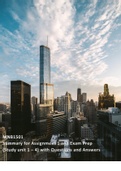MNB1501
Summary for Assignment 1 and Exam Prep
(Study unit 1 – 4) with Questions and Answers
,STUDY UNIT 1 – MNB1501
THE ROLE OF BUSINESS IN SOCIETY
1. Business World
a. Transforming resources into products and services in order to meet peoples’ needs.
2. The products and services are exchanged for profit
FOUR ELEMENTS:
1. Human activities
• organizations own machines and property but have to managed or operated by people
2. Production
• transforming certain resources into products and services.
a. PRODUCTS:
i.e. conversion of flour, sugar and butter into bread
conversion of bricks, sand, cement, wood and steel into a house
b. SERVICES:
i.e. Hospital, beds and medicine into a health service
Airline transports passengers to their required destinations, and as this happens,
the passengers become part of the transformation process
3. Involves exchange
• Exchange products and services for money
4. Profit
• Reward for meeting people’s needs
• Helps business to pay for resources and make a living
TYPES OF PRODUCTS:
1. Predominantly tangible products
• Bread, cars, houses, or bicycles
2. Predominantly Services
• Entertainment, communication, insurance, or transport
Business cannot operate without society
• Needs and values of society influence what business does.
i.e., protecting the environment
• Organizations influence behaviour patterns of people in a particular society by developing new
products.
i.e., Impact of cell phones, tablets etc. on social life.
• Success of business has an impact on the prosperity of a society.
i.e. mining towns
, The MOST IMPORTANT CHARACTERISTIC of the developed countries is the freedom of
individuals to establish a business of their choice and to produce within limits whatever
product they so choose.
MARKET SYSTEM/MARKET ECONOMY
• Individuals themselves decide what to produce, how to produce and what price of their
product will be.
• Various types of small and large business organisations(industries) that collectively mobilise
the resources of a country to satisfy the needs of its inhabitants.
a. Formal Sector (large)
• Standard Bank, Naspers, Vodacom, Anglo American, Tiger Brands, Eskom etc.
• most of economic activity is generated by the formal sector
• Part of formal economy
• Contribute to rates and taxes
b. Informal Sector / Micro enterprises (small)
• one person businesses only 5.8% of economic activity
• Not registered
• Not part of formal economy
• Does not contribute to rates and taxes
BUSINESS WORLD IS UNDER INCREASING PRESSURE TO ENSURE:
1. Corporate Social responsibility
• Limiting malpractice through regulation.
• Social responsibility measured by the contribution of a business towards employment
opportunities, equity, empowerment.
2. Business ethics
• Closely related to social responsibility.
• Business ethics focuses specifically on the ethical behaviour of managers and
directors, executives of organisations.
3. Employment Equity / Affirmative action / Equity regarding organisation workforce
• Aimed at creating equal employment opportunities
• Employment equity Act 1998
4. Environmental damage / sustainability
• Pressure groups to protect environment from all types of pollution.
5. Consumerism
• Protects consumers against unsafe products and malpractice by exerting moral and
economic pressure on businesses.
• South African National Consumer Union





